10 Best Ecommerce Hosting for Small Businesses (2026)

Picking the right eCommerce hosting service is a big deal for businesses aiming to succeed online. With a 7% drop in conversions with every 100-millisecond delay in response time, your hosting choice can significantly impact your sales.
From shared to dedicated servers, options vary. Finding a reliable provider that boosts speed, security, and user experience is tough. We’ve handpicked the top 10 eCommerce hosting services for small businesses to help you find the best solution for your business needs.
What is E-commerce Hosting?
E-commerce hosting is a service tailored for online stores, providing the necessary infrastructure, tools, and resources for selling online. This includes specialized tools like payment processing, security, and customer data management.
There are several types of e-commerce hosting options available: shared, VPS, dedicated, and cloud hosting. Each offers unique features and benefits to suit various needs and budgets.
How Does the Choice of Hosting Provider Impact Your Online Business?
A good host boosts website speed, ensures security, and supports growth by handling traffic spikes and offering flexible resources. Secure hosting protects customer data and complies with laws. Reliable hosts offer strong support and e-commerce expertise. Conversely, poor choices lead to slow performance and lost trust. The right plan offers the best value, fitting within your budget.
What Are the Top 10 Ecommerce Web Hosting Providers?
- Bluehost
- HostGator
- SiteGround
- IONOS
- InMotion Hosting
- DreamHost
- A2 Hosting
- GoDaddy
- Hostinger
- ScalaHosting
1. Bluehost
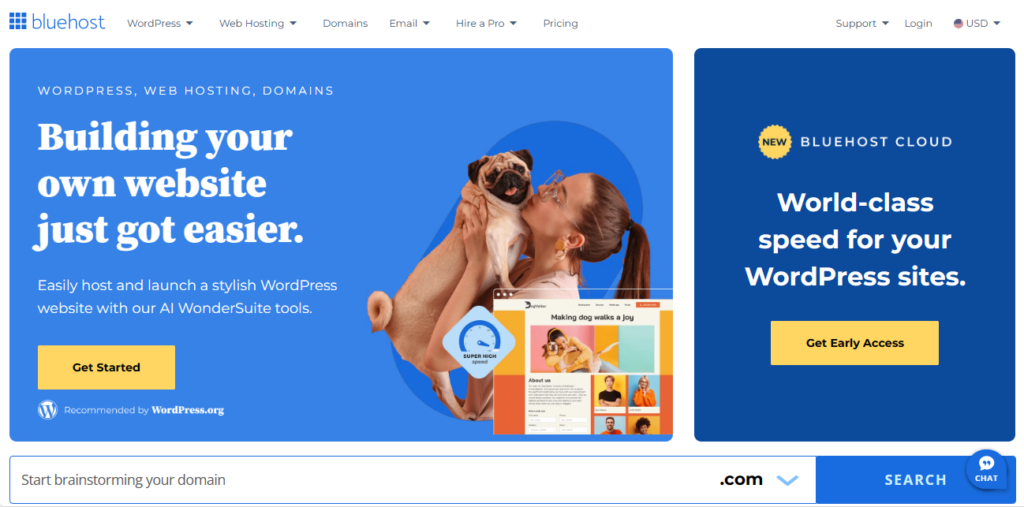
Bluehost is a popular hosting service provider founded in 2003. It is known for its value-priced plans, user-friendly interface, and strong uptime stats. It’s particularly favored among bloggers and small businesses. It’s also the longest-running WordPress.org recommended host.
Bluehost offers a wide range of hosting options to cater to various needs. These include Shared Hosting, VPS (Virtual Private Server) Hosting, and Dedicated Hosting.
For those specifically using WordPress, Bluehost provides WordPress Hosting. They also offer WooCommerce Hosting for those who are running e-commerce sites on WordPress.
Additionally, Bluehost provides Online Store Hosting, a solution designed to help businesses sell products online. These diverse hosting options make Bluehost a versatile choice for many different types of websites.
Key Features
Here’s a breakdown of their key features:
Easy Setup and Management
- User-friendly interface simplifies website creation and management, ideal for beginners.
- Includes a free domain name for the first year and a one-click WordPress installation.
- Offers the ability to build unlimited websites on a single plan (on most plans).
Ecommerce Friendly
- Their Online Store plan comes with tools to build and manage an online store.
- The plan includes over $450 worth of eCommerce plugins for enhanced functionality.
- Supports unlimited products and facilitates easy migration from existing stores.
Performance Benchmarks
- Bluehost boasts a reputation for fast loading times and minimal downtime, critical for a smooth customer experience.
Security
- Provides advanced security features like SiteLock protection, free SSL certificates, and domain privacy for comprehensive protection.
- Offers free malware scanning on most plans.
Customer Support
- 24/7 customer support via phone, email, and live chat ensures prompt assistance whenever needed.
- They also have an extensive online knowledge base for self-service troubleshooting.
Pricing
Bluehost offers a variety of pricing plans to cater to different needs. The pricing levels range from very budget-friendly to more expensive, and each tier offers more features than the one before.
Bluehost’s starting price for the basic plan is $1.99 per month for the first year, paid annually. However, renewal rates can increase significantly.
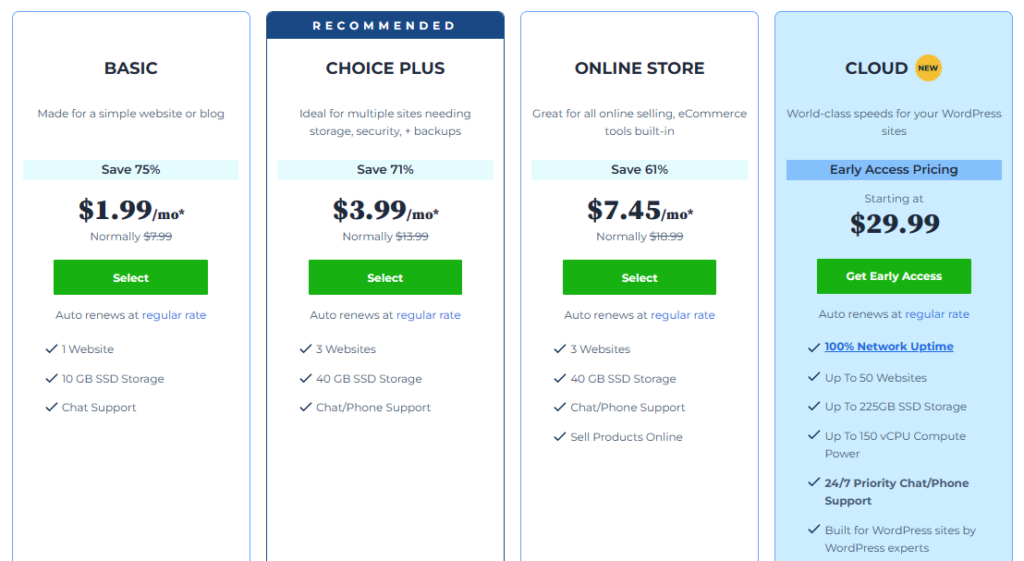
Pros & Cons
Pros
- Affordable starter plan
- Free domain name
- User-friendly interface
- 24/7 customer support
- One-click WordPress installation
- Free CDN
- Recommended by WordPress.org
Cons
- Higher renewal rates
- Upselling tactics
- Limited storage on some plans
- No daily backups on all plans
- No month-to-month plans
- Inconsistent customer service experiences
- Ecommerce features not available on all plans
Rating
Trustpilot rating 4/5 based on 12.2k+ reviews.
2. HostGator
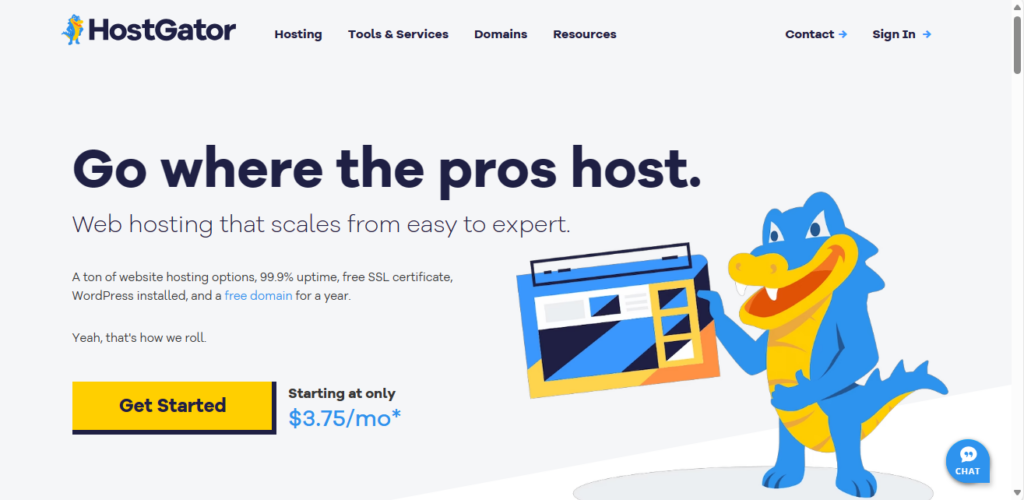
HostGator is a big web hosting company that started in 2002. It’s grown a lot since then, hosting over 8 million websites globally. They offer different kinds of hosting, such as shared, reseller, VPS, and dedicated hosting. It is particularly popular for shared hosting due to its affordable starter plans and easy setup.
Key Features
- It provides unlimited storage and unmetered bandwidth for all plans.
- It offers one-click WordPress installs.
- It provides a free SSL certificate with the web hosting plan.
- It offers a free domain name for the first year.
- It provides a drag-and-drop website builder with over 100 mobile-friendly templates.
Usability
HostGator is known for its user-friendly cPanel, which offers access to all features needed to manage a website effectively. The inclusion of 1-click installs for popular apps and a drag-and-drop website builder (Gator Website Builder) makes it suitable for users without technical expertise.
Performance Benchmarks
- Websites on HostGator load in less than a second in tests, performing faster than 94% of tested sites.
- Offers a 99.99% uptime guarantee with credits offered if this standard is not met.
Customer Support Options and Quality
HostGator provides 24/7 customer support via phone, live chat, and email. The support team is backed by a vast library of documentation, including over 500 video tutorials and 700 articles, helping users troubleshoot and learn at their own pace.
Security Measures and Certifications
- HostGator provides SSL certificates, daily backups, and spam protection as standard security features.
- HostGator is PCI-compliant, ensuring secure e-commerce transactions.
- HostGator partners with SiteLock for enhanced malware protection and vulnerability detection.
- HostGator’s data centers have DDOS protection and an IP-based firewall.
- Extra cost options include domain privacy and automated backups.
Integrations with Popular Ecommerce Platforms
HostGator supports integrations with major eCommerce platforms like Magento and WooCommerce via one-click installs, making it easy to set up and manage online stores.
Pricing Plans
HostGator’s hosting plans are designed to accommodate various business sizes and budgets, with prices ranging from $3.75 to $91.98 per month, depending on the chosen hosting service.
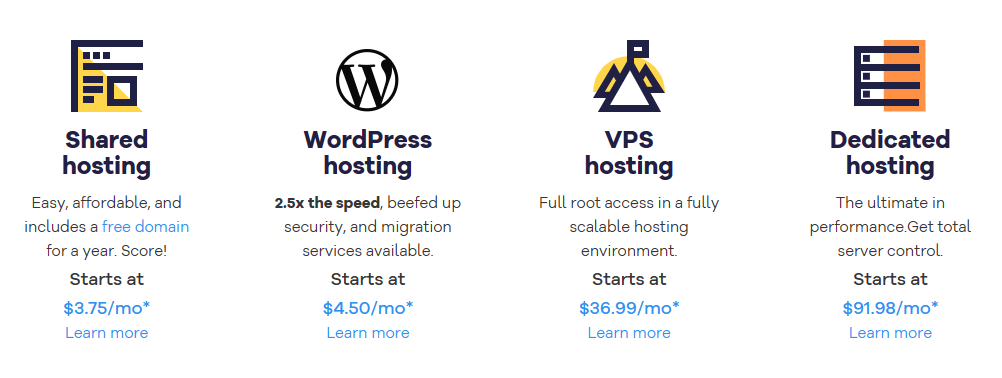
Pros and Cons
Pros
- Affordable long-term plans
- Unlimited storage and bandwidth (with fair usage policy)
- One-click WordPress installs
- Free SSL certificate and domain name for the first year
Cons
- Expensive short-term plans
- No Linux server option
- Uptime can be inconsistent
- Extra costs for comprehensive security measures.
Rating
Trustpilot rating 4/5 based on 6k+ reviews.
3. SiteGround

SiteGround started in Sofia, Bulgaria, in 2004 and now hosts around 3 million domains globally. They provide various hosting options, like shared, cloud, and enterprise hosting, alongside email hosting and domain services.
They are committed to their customers, offering hosting across multiple data centers and bringing on board passionate experts dedicated to delivering outstanding website care. In a significant move towards technology improvement, by 2020, SiteGround switched all its domains to Google Cloud, leveraging Google’s reliable SSD storage for data.
Key Features
- SiteGround offers several types of hosting, including web hosting, WordPress hosting, WooCommerce hosting, and Cloud hosting.
- It provides free WordPress installation and migration, free SSL, daily backup, free CDN, free email, WP-CLI and SSH, and unlimited databases.
- SiteGround has six data centers in the United States, the Netherlands, the UK, Germany, Australia, and Singapore.
- It uses cutting-edge technology like NGINX server technology and a custom caching tool, SuperCacher, specifically designed for WordPress.
- SiteGround’s infrastructure is powered by Google Cloud, ensuring a reliable and high-performance network.
Usability
- SiteGround offers a custom control panel that simplifies navigation and accessibility.
- It’s beginner-friendly with a helpful knowledge base, a startup walk-through, and a Website Setup Wizard.
Performance Benchmarks
- SiteGround is known for its fast load times and high uptime.
- It uses Google Cloud infrastructure, free SSL security, and a custom web application firewall.
- It maintains an impressive uptime record, ensuring reliable access to your website for visitors at all times.
Customer Support Options and Quality
- SiteGround offers 24/7 support via live chat, phone, and ticketing systems.
- It is known for fast, friendly, and helpful customer support.
Security Measures and Certifications
- SiteGround employs advanced security measures like a custom firewall, real-time security monitoring, and proactive malware detection.
- It provides free SSL certificates to encrypt data transmission and ensure secure communication between your website and its visitors.
Integrations with Popular Ecommerce Platforms
- SiteGround provides one-click installations for popular e-commerce platforms like WooCommerce and Magento.
- It has added a new managed Easy Digital Downloads (EDD) hosting product to its web hosting portfolio to offer a faster solution for building eCommerce platforms.
Pricing Plans
SiteGround offers several pricing plans depending on the type of hosting and the period for which it will be prepaid.
The StartUp plan starts at $3.99 per month, the GrowBig plan starts at $6.69 per month, and the GoGeek plan starts at $10.69 per month.

Pros & Cons
Pros
- All plans use SSD storage.
- Free CDN for faster loads.
- Static and dynamic caching.
- Free SSL.
- Free email (webmail).
- Managed hosting.
- Uses Google Cloud data centers.
Cons
- Pricier option than competitors.
- Priority support for high-level plans only.
- No phone support.
- Limited storage and site visitor allowances.
- No physical scaling options.
Rating
Trustpilot rating 4.8/5 based on 15.9k+ reviews.
4. IONOS
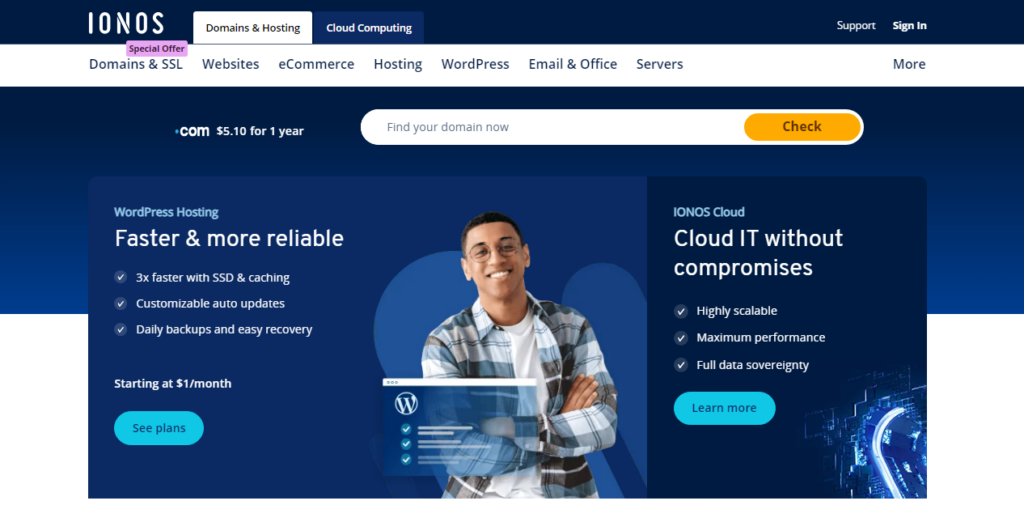
IONOS is a prominent web hosting and cloud services provider focusing on the needs of small and medium-sized businesses. Originally named 1&1, the company was established in Europe in 1988 and expanded its operations to the United States in 2003. It underwent a rebranding in 2020, adopting the name IONOS. Today, IONOS manages 22 million domains and contracts with 8.9 million customers worldwide.
Key Features
- It offers affordable plans and is known for being reliable and secure.
- IONOS also offers VPS, dedicated, cloud, and enterprise hosting.
- Unlimited storage for Business and Expert plans
- IONOS provides daily backups for all its hosting plans
- IONOS offers unlimited FTP accounts.
Usability
IONOS offers a user-friendly control panel. It also offers a Hosting Manager mobile app that lets you manage your account from anywhere.
Performance Benchmarks
IONOS operates 15 facilities in nine countries, including ten geo-redundant ISO 27001-certified data centers that deliver 99.9% website uptime.
Customer Support Options and Quality
IONOS offers customer support via phone, email, and chat. Every hosting plan is backed with a 30-day money-back guarantee. However, there have been reports of inconsistent support quality.
Security Measures and Certifications
IONOS emphasizes security by implementing measures such as DDoS protection, free Wildcard SSL certificates with 256-bit encryption, and regular backups to safeguard websites and data. IONOS data centers are secured by ISO 27001 certification.
Integrations with Popular Ecommerce Platforms:
IONOS offers integrations with popular eCommerce platforms such as Amazon, eBay, Facebook Shops, Instagram Shopping, Google Shopping, Snapchat Pixel, and Pinterest Tag.
Pricing Plans
IONOS offers affordable pricing plans. The starting price is as low as $1 per month for the first year, then $10 per month.
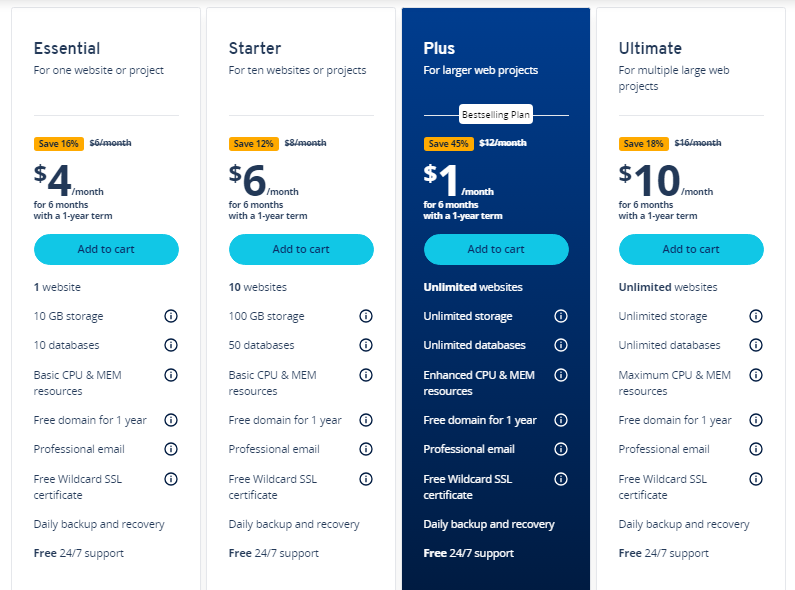
Pros & Cons
Pros
- Low-cost intro rates as low as $1 per month
- Unlimited storage for Business and Expert plans
- Fast website load speed
- Free Wildcard SSL certificate
Cons
- Inconsistent support quality
- Frequent upselling
- No free website migration
- Only one free email account per plan
Rating
Trustpilot rating 4.5/5 based on 20k+ reviews.
5. InMotion Hosting
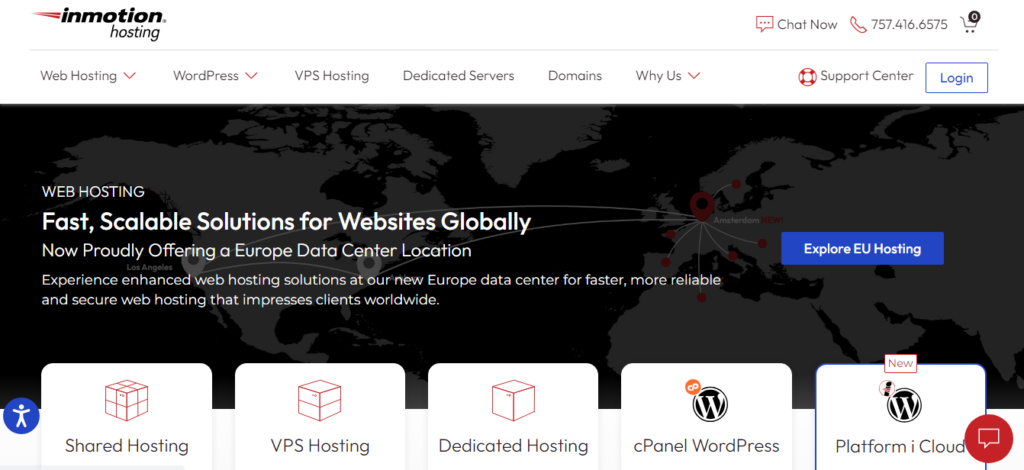
Established in 2001, InMotion Hosting is an employee-owned domain and web hosting company known not only for its reliable services but also for its popular web hosting affiliate program, now servicing over 170,000 customers globally. The company offers a wide array of web hosting solutions tailored to meet the distinct needs of both businesses and individuals. Its product lineup includes shared hosting, WordPress hosting, cloud WordPress hosting, VPS hosting, reseller hosting, and dedicated servers.
InMotion Hosting won the Winter 2024 Leader award from SourceForge, the world’s largest software reviews and comparison website. This award highlights InMotion Hosting’s commitment to excellence and places it in the top fifth percentile of highly-reviewed products on SourceForge. To win the Winter 2024 Leader award, InMotion Hosting had to receive impressive, high-rated user reviews.
Key Features
- All plans offer unlimited email
- All shared and WordPress plans include unlimited data transfers.
- Competitive money-back guarantee policy.
- 24/7 customer support.
- Active community forum.
- International data center options.
- Free SSL, hack and malware protection, and DDoS prevention.
Usability
InMotion Hosting uses BoldGrid as its page builder, which means building a new WordPress site is a simple drag-and-drop process. You can easily create and restore backups on InMotion hosting with a single click.
Performance Benchmarks
InMotion Hosting has an average response time of 331 ms. It also offers a 99.99% uptime guarantee.
Customer Support Options and Quality
InMotion Hosting provides 24/7/365 live support via live chat, support tickets, and a forum. However, phone support is only available on Power and Pro plans. They also re-launched their 24/7 live chat system in February 2024.
Security Measures and Certifications
InMotion Hosting’s data centers comply with stringent standards such as SSAE 18 SOC 1 Type 2, SOC 2 Type 2, PCI DSS 3.2 Validation, ISO 27001, NIST 800-53/FISMA, and HIPAA.
Integrations with Popular Ecommerce Platforms
InMotion Hosting offers hosting solutions for WooCommerce, Magento, PrestaShop, OpenCart, Drupal Commerce, and custom-built stores for all the platforms mentioned above.
Pricing Plans
InMotion Hosting offers a variety of pricing plans to suit different needs, starting at $2.99 per month.

Pros & Cons
Pros
- Quick response time.
- Excellent uptime.
- Variety of hosting plans and options.
- Clear pricing without giant leaps in price from signup to renewal.
- Good bandwidth.
- Add-ons are affordable.
- Excellent customer support.
Cons
- No Windows servers
- Month-to-month payment plan is not available for the basic plans
- Phone support only available on Power and Pro plans
- No content delivery network
Rating
Trustpilot rating 4/5.
6. DreamHost
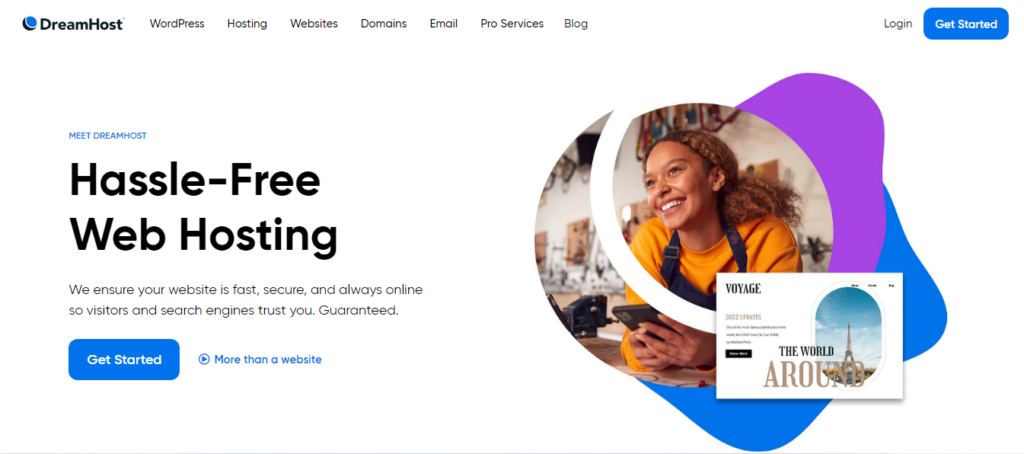
DreamHost is a well-known web hosting provider that was founded in 1997. It has grown to serve over 400,000 customers in 100 countries and hosts over 1.5 million websites, including 750,000 WordPress sites. DreamHost offers a range of hosting services, including shared hosting, VPS hosting, dedicated server hosting, and cloud hosting.
As of 2026, DreamHost continues to innovate and improve its services. It offers five different types of hosting, including everything from shared website hosting to cloud hosting. Many also praise its one-click WordPress installs, which make it a cinch to get a site up and running in just a few minutes.
Key Features
- DreamHost provides a free domain registration for the first year.
- All plans come with unmetered bandwidth.
- The one-click Installer feature simplifies the process of adding web applications.
- 97-Day Money-Back Guarantee is available for shared hosting.
- DreamHost offers free secure sockets layer (SSL) certificates.
- Web-based firewall comes with a large number of configurable rules that restrict traffic to your site.
- Automated Backup is available as a premium option.
- DreamHost offers free domain privacy protection.
Usability
DreamHost simplifies website creation with its one-click WordPress installation and intuitive control panel, enabling users to launch their sites effortlessly in minutes.
Performance Benchmarks
DreamHost uses solid-state drives (SSDs) for all its shared hosting plans, contributing to its excellent performance. It also uses the NGINX web server, which is known for its speed and efficiency.
Customer Support Options and Quality
DreamHost offers 24/7 support via email and live chat. However, it does not provide telephone support. The response time goal for support is within a few minutes via live chat and one to two hours via email.
Security Measures and Certifications
HostGator provides free SSL certificates. However, its antimalware tool is a paid add-on. It also offers free domain privacy.
Integrations with Popular Ecommerce Platforms
- DreamHost offers managed WordPress hosting tailored for performance and compatibility with popular eCommerce plugins.
- It offers a flexible and open-source WordPress eCommerce platform, WooCommerce, which you can easily enable using a plugin on your WordPress site.
Pricing Plans
HostGator offers a variety of pricing plans:
- Shared web hosting: $2.95 per month.
- DreamPress WordPress hosting: $16.95 per month.
- VPS hosting: $13.75 per month.
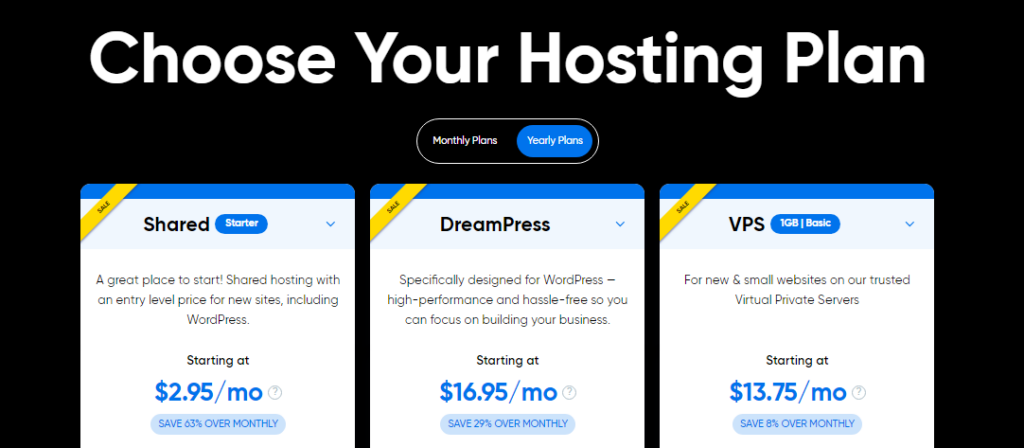
Pros & Cons
Pros
- Free SSL certificates.
- Free domain for the first year.
- Free WHOIS Privacy protection.
- Unmetered bandwidth on all plans.
- 1-click installer.
- 97-day money-back guarantee for shared hosting.
Cons
- The antimalware tool is a paid add-on.
- Slower average response time than competitors.
- No customer support phone number.
- No money-back guarantee for virtual private server (VPS) and dedicated plans.
Rating
Trustpilot rating 4.7/5 based on 5.7k+ reviews.
7. A2 Hosting
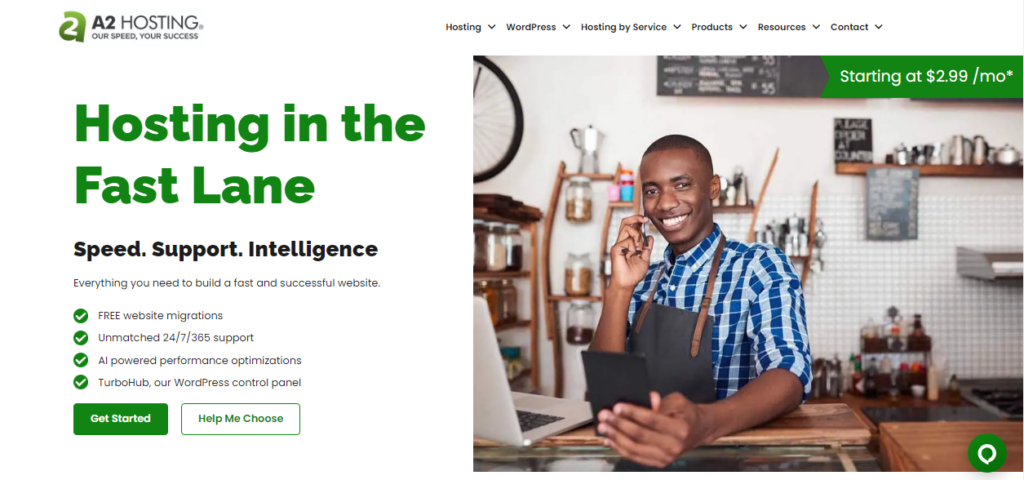
A2 Hosting was started in 2001 by Bryan Muthig as a two-room office in Ann Arbor, Michigan. Over the years, A2 Hosting has grown significantly and now serves 110,000 customers in 223 countries. It offers a variety of hosting services, including standard shared hosting plans, shared and managed WordPress hosting, virtual private server (VPS) hosting, reseller hosting, and dedicated hosting.
Key Features
Speed
A2 Hosting boasts super-fast page loading times. It claims its Turbo hosting plans are 20 times faster and can handle up to nine times more traffic.
Usability
A2 Hosting has been rated highly for its ease of use. It offers a user-friendly cPanel interface and supports popular programming languages and frameworks.
Performance Benchmarks
A2 Hosting has been praised for its fast load times and excellent uptime. It also offers a 99.9% uptime guarantee.
Customer Support Options and Quality
A2 Hosting provides 24/7/365 customer support via phone and live chat. They also offer support via email and a ticketing system.
Security Measures and Certifications
A2 Hosting implements security features like HackScan to protect websites from potential threats proactively. They also provide free SSL certificates for enhanced website security. They maintain operational integrity through uninterrupted power supplies, N+1 redundancy, and compliance with key industry standards such as ISO 27001 and PCI DSS.
Integrations with Popular Ecommerce Platforms
A2 Hosting supports eCommerce tools and offers one-click deployment with WooCommerce for improved site performance, security, and powerful eCommerce features. It also supports other eCommerce applications like PrestaShop, Magento, OpenCart, and more.
Additional Features
A2 Hosting offers features like Cloudflare CDN, free SSL, unlimited bandwidth, Anycast DNS, website staging, at least 100 GB SSD storage, DDoS protection, and an anytime money-back guarantee.
Pricing Plans
A2 hosting offers different pricing plans for various hosting options. Prices for shared hosting start at $2.99 per month for your first year.
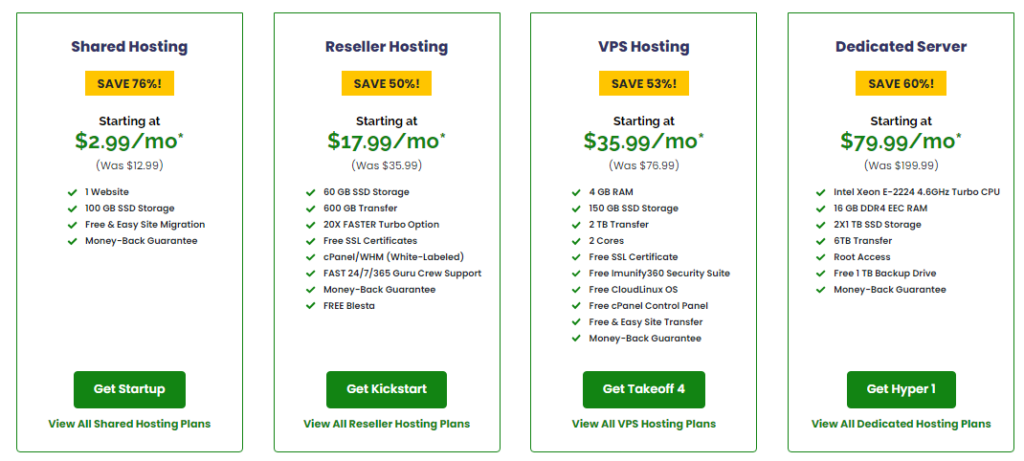
Pros & Cons
Pros
- Low introductory rates
- Robust security features
- Fast load times
- Excellent uptime
- Four server locations
- Free site migration
- 24/7 phone service and live chat
Cons
- Pricing increases upon renewal
- No Windows hosting options
- No free website builder
- Only one website on the base plan
- No free domain name
- The sign-up process is very time-consuming
- Downgrading to a lower-priced hosting plan will make the migration fee chargeable
- Renewal rates are very excessive
- The cheapest plan contains limited features only
Rating
Trustpilot rating 4.6/5 based on 2.7k+ reviews.
8. GoDaddy

GoDaddy is a globally recognized domain registrar and web hosting provider that hosts more than 84 million domain names. The company was founded in 1997 and has since been committed to helping people easily start, grow, and successfully run their own ventures. It offers a wide range of services, including shared hosting, WordPress hosting, and website building.
Key Features
- Free domain registration for the first term (with certain plans)
- Easy-to-use website builder with a drag-and-drop interface
- Professional email services with Microsoft 365 integration
- Free SSL certificates for website security
- SEO tools, email marketing services, and social media management tools
- Daily backups, one-click WordPress installation
Usability
GoDaddy offers a free website builder, which is great for new users who may not be comfortable with cPanel or even WordPress. With GoDaddy’s site builder, you don’t need to have website-building skills.
Performance Benchmarks
GoDaddy boasts high-performance web hosting plans and a guaranteed 99.9% uptime. However, some reviews suggest avoiding the basic shared hosting as it’s not worth the price tag.
Customer Support Options and Quality
GoDaddy offers 24/7 support. You can reach out to their award-winning GoDaddy Guides for help via chat or call.
Security Measures and Certifications
GoDaddy provides robust security with a Web Application Firewall, daily malware scans, and a free SSL Certificate. It enhances safety against cyber threats through automatic WordPress updates, DDoS protection, and integrated Cloudflare CDN.
Integrations with Popular Ecommerce Platforms
GoDaddy’s all-in-one connected commerce platform offers seamless integration with popular eCommerce platforms. For online and in-person businesses, the GoDaddy Smart Terminal integrates with GoDaddy’s eCommerce solutions to unify online and in-person sales.
Pricing Plans
GoDaddy’s pricing starts from $4.99 per month (three years paid up front) for hosting. The prices vary depending on the specific hosting plan.

Pros & Cons
Pros
- User-friendly interface
- Wide range of services
- 24/7 customer support
- 99.9% uptime guarantee
- SSL certificates for website security
Cons
- Limited customization options
- High renewal rates
- Some features may incur additional costs
- No free site transfer
Rating
Trustpilot rating 4.7/5 based on 96.5k+ reviews.
9. Hostinger
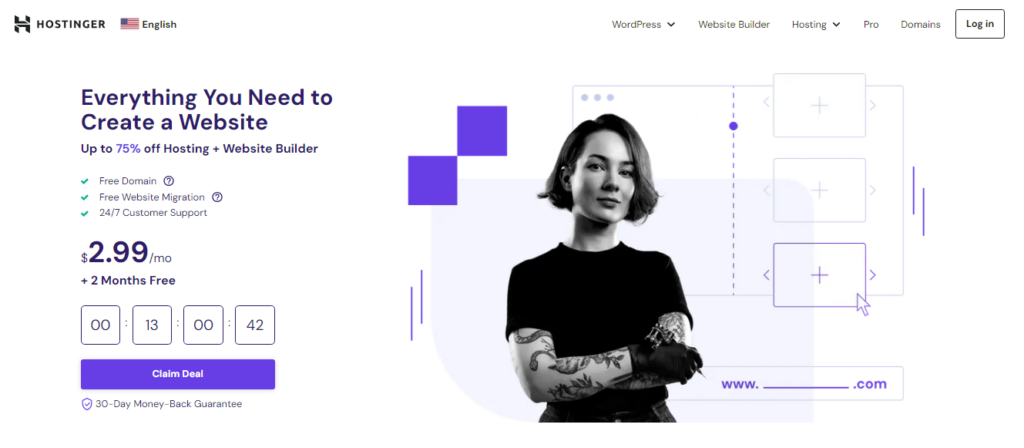
Hostinger is a leading web hosting provider and internet domain registrar that was established in 2004. It has grown significantly over the years and now serves over 29 million users in 178 countries. Hostinger offers a variety of hosting services, including shared hosting, VPS hosting, cloud hosting, and WordPress hosting.
As of 2026, Hostinger continues to innovate and improve its services. It’s known for its affordability and custom hPanel, which appeal to beginners and those needing budget-friendly hosting. In addition, it offers a superb lineup of AI-powered tools for WordPress website creation and management.
Key Features
- Variety of hosting plans, including shared hosting, VPS hosting, and cloud hosting
- Free domain name with some of its hosting plans
- All plans come with an available website builder
- Free SSL certificates
- Custom-built hPanel
- An optional Minecraft server
- Multilingual Customer Support
- AI-Powered tools
- WordPress optimized hosting with 1-click installation
Usability
Hostinger is designed with beginners in mind, making it incredibly easy to manage. It offers automatic wizards that take care of setting up websites, emails, domains, and VPS services. The control panel combines great simplicity and functionality.
Performance Benchmarks
Hostinger offers a 99.9% uptime guarantee. It keeps you connected with its quick loading speed, dedicated IPs, and servers operating on leading CloudLinux from 10 data centers.
Customer Support Options and Quality
Hostinger provides 24/7 customer support via live chat. However, it does not offer telephone support.
Security Measures and Certifications
Hostinger follows the latest security industry standards and best security practices to protect its servers and ensure information security. It offers server and infrastructure protection, firewall protection, advanced security modules, and anti-malware protection.
While Hostinger is not ISO 27001 or SOC certified, it has extensive security practices put in place to ensure information security. It also uses CloudLinux with LVE containers for account isolation.
Integrations with Popular Ecommerce Platforms
Hostinger integrates with popular eCommerce platforms like WooCommerce, PrestaShop, and Magento. It also offers its own eCommerce site builder for small to medium-sized businesses.
Pricing Plans
Hostinger’s pricing starts at $2.99 per month for shared web hosting. It also offers other hosting plans at different prices.
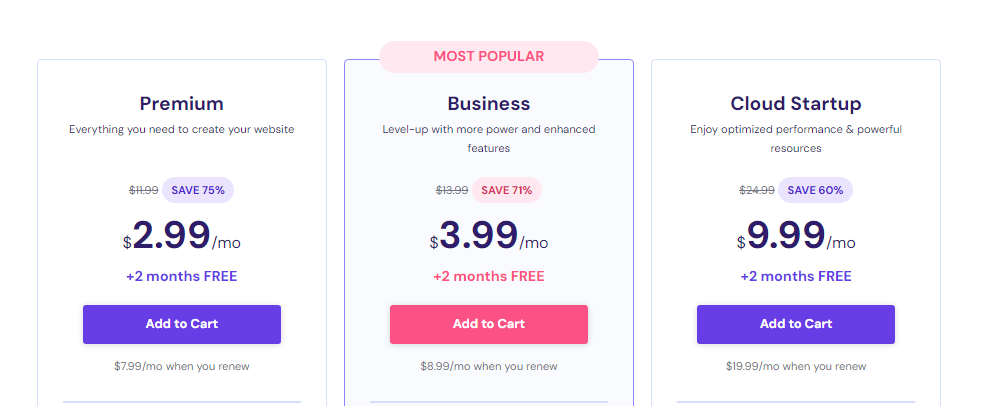
Pros and Cons
Pros
- Affordable pricing
- Website builder available for all plans
- User-friendly custom control panel
- Optional Hostinger Minecraft server
- Multilingual customer support
- High user ratings on Trustpilot and HostAdvice
Cons
- Limited resources on entry-level plan
- No cPanel
- No telephone support
- Only one email account on the single shared hosting plan
Rating
Trustpilot rating 4.6/5 based on 25.5k+ reviews.
10. ScalaHosting
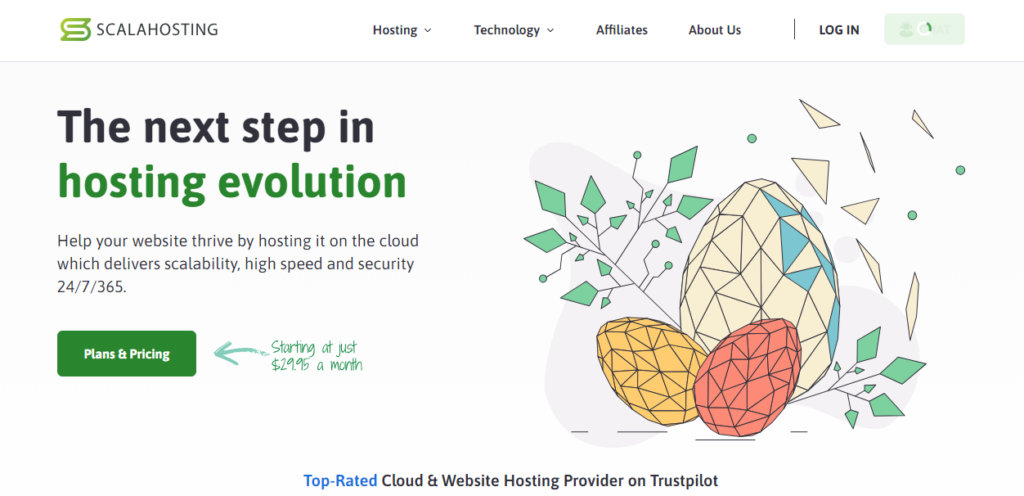
ScalaHosting is a US-based cloud hosting provider that has been offering web hosting services since 2007. Their primary focus is on fully managed cloud VPS solutions. They aim to empower every website owner with fully managed cloud VPS at the price of an ordinary shared hosting plan.
Scala Hosting has served over 50,000 customers and hosts more than 700,000 websites. Scala Hosting has developed its own control panel, SPanel, and other in-house solutions that have changed the status quo in the web hosting industry. It offers high-performance, ultra-secure, and low-cost VPS hosting.
Key Features
- ScalaHosting’s main offering is their fully managed cloud VPS solutions.
- They have developed an in-house cPanel/WHM alternative called SPanel.
- They provide hosting services in 32 cities around the globe, thanks to the integration with DigitalOcean and AWS.
- They are one of the few providers that offer a fully managed AWS cloud service with a control panel.
- They provide a Content Delivery Network (CDN) with all hosting packages, automatic daily remote backups, free website migration, and a free SSL certificate with advanced security options.
Usability
ScalaHosting offers an array of one-click install features that significantly enhance user convenience and efficiency. They also provide a user-friendly client area that helps users manage all their personal information and control their hosting services.
Performance Benchmarks
ScalaHosting offers excellent server speeds. They have a 99.9% uptime guarantee. However, the exact loading speed and uptime may vary depending on the specific plan and server location.
Customer Support Options and Quality
ScalaHosting offers 24/7 support via its website, live chat, and ticket/email. They also provide a knowledge base for self-help. Customer reviews highlight the quality of their customer service.
Security Measures and Certifications
ScalaHosting meets the highest levels of compliance with industry standards. Their hosting service is audited under SSAE 18 SOC 2 Type II, PCI-DSS, GLBA, and HIPAA standards annually. The company is ITAR and EU-US Privacy Shield registered. They also implement advanced security measures in their AWS hosting.
Integrations with Popular Ecommerce Platforms
ScalaHosting ensures full compatibility with any ecommerce platform, including WooCommerce and BigCommerce. They also offer integrations with leading CDN providers.
Pricing Plans
ScalaHosting offers various pricing plans starting from $2.95 per month.
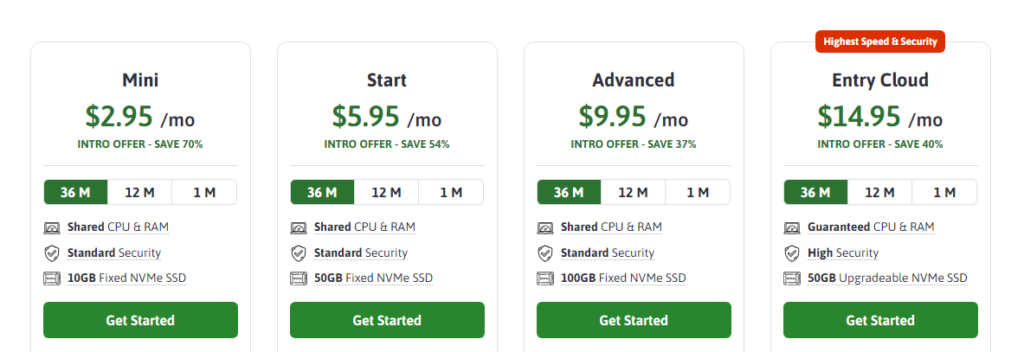
Pros and Cons
Pros
- Excellent server speeds
- Scalability
- 99.9% uptime
- Custom management panel
- Automated backup
- Affordable VPS hosting
Cons
- Higher pricing than many competitors
Rating
Trustpilot rating 5/5.
Which Website Host is Best for eCommerce?
Here’s a breakdown of the best web hosting providers for different types of businesses and audiences based on detailed reviews and testing:
Bluehost – Best for WordPress Users
Bluehost is ideal for small businesses and WordPress users. Bluehost excels with its WordPress integration, offering easy setup and management. It’s highly recommended for those who are starting out with WordPress or planning to scale their WordPress sites.
HostGator – Best for Businesses on Budget
HostGator is great for businesses looking for a balance between performance and cost. HostGator is known for its reliable uptime, budget-friendly options, and a variety of hosting plans.
SiteGround – Best for Excellent Customer Support
SiteGround is praised for exceptional uptime and customer support, making it ideal for businesses that need reliable hosting with responsive service.
IONOS – Best Secure eCommerce Hosting Option
IONOS offers a range of hosting services with a strong emphasis on data sovereignty, which is critical for businesses operating under stringent EU data protection laws.
InMotion Hosting – Best for Small to Medium Sized Business
InMotion Hosting offers a range of hosting types, including shared, VPS, dedicated, and managed WordPress hosting. They are particularly noted for excellent customer service and reliable hosting performance, making them a good choice for small to medium-sized businesses that anticipate growth and need a host that can scale with them.
DreamHost – Best for Startups and Developers
DreamHost is a top choice for startups and developers. It provides extensive domain management tools that are easy to use, making it ideal for new tech ventures or businesses that want hands-on control of their online presence.
A2 Hosting – Best for Speed and Reliability
A2 Hosting is ideal for businesses and individuals who prioritize fast website performance. With a focus on advanced technologies like Turbo Servers that offer up to 20x faster page loads compared to standard hosting, A2 Hosting is great for high-traffic websites and e-commerce platforms.
GoDaddy – Best For Non-Tech Savvy Beginners
GoDaddy is best for small businesses and non-tech-savvy users who want an all-in-one solution. GoDaddy offers a variety of tools for building, managing, and marketing a professional online presence with ease. Their user-friendly hosting solutions make it easy for beginners to start and grow their online business.
Hostinger – Best Value for Money Hosting
Hostinger offers the best value for money, particularly suited for small businesses and personal websites. Hostinger is known for its affordable hosting plans without compromising on the necessary features like speed, uptime, and customer support.
ScalaHosting – Best Managed VPS Solution at a Competitive Price
ScalaHosting is ideal for those looking for managed VPS solutions at a competitive price. ScalaHosting provides customizable VPS hosting with an emphasis on security and scalability, offering features like real-time malware protection and automated backups, making it suitable for businesses that require robust hosting solutions.
Read More: 13 Best Ecommerce Niches With High Growth Potential
How We Selected the Best eCommerce Hosting Services?
In selecting the best ecommerce hosting services, we considered several key factors. These include the price, features, usability, performance, customer support, and rating of each service.
Our reviews are not just based on our opinions. We analyze and synthesize various user reviews, expert opinions, and performance tests from trusted web hosting review sources. This approach ensures our reviews are factual and up-to-date and can help you decide which web hosting provider may best suit your specific business needs or target audience.
In case you are looking for a hosting service for your Magento store, you can check out a dedicated blog – 10 Best Magento Hosting Providers!
How to Choose the Best Online Store Hosting?
Choosing the best online store hosting involves considering several key factors that align with your specific business needs. Here’s how small businesses can select the ideal e-commerce hosting provider:
Technical Needs
- Estimate the amount of traffic your online store is likely to receive. This will help you determine the level of server resources needed to ensure smooth user experiences without downtime or slow loading times.
- Assess how much data storage and bandwidth your site will require based on the number of products you plan to list, the expected traffic, and the size of your digital assets.
- E-commerce sites must be secure to protect sensitive customer data. Look for hosting solutions that offer SSL certificates and are PCI-compliant to handle credit card transactions securely.
- Your chosen hosting should scale as your business grows. Ensure that upgrading to a more robust plan or adding resources is straightforward and cost-effective.
Budget
- Compare the pricing models of different hosts — monthly, annual, or pay-as-you-go — to find one that fits your financial plan.
- Be aware of any hidden charges, such as setup fees, domain registration, and renewal costs, which can affect your budget.
Ease of Use
- A user-friendly control panel is crucial for managing your website effectively. It should allow you to configure and update your site without needing advanced technical skills.
- Hosting services should offer easy one-click installation for popular e-commerce platforms like WooCommerce, Shopify, or Magento.
- Reliable customer support is essential, especially for businesses that operate online round the clock. Ensure the hosting provider offers 24/7 support via multiple channels.
Features Essential for E-commerce
- Your hosting should seamlessly integrate with various shopping cart technologies to provide a smooth checkout experience for customers.
- Check for the ability to support multiple payment gateways, which will give your customers more options and enhance their shopping experience.
- Essential tools for managing inventory, uploading product images, and writing descriptions should be available to help you keep your store organized and appealing.
- Look for hosting that includes SEO tools, email marketing integrations, and other marketing features that can help you attract and retain customers.
- To make data-driven decisions, ensure your hosting provider offers comprehensive analytics and reporting tools that allow you to track sales, customer engagements, and other vital metrics.
In conclusion, selecting the right ecommerce hosting provider is an important decision that can greatly influence the performance and success of your online store. With the insights provided on various hosting services, we hope to have made your decision process easier. Remember, the key is to find a hosting solution that not only meets your current needs but also supports your future growth.
Still trying to figure out the best ecommerce hosting for your business? Don’t worry. As a leading provider of e-commerce consulting and development solutions, Aureate Labs has the expertise to guide you toward the perfect hosting option that fits your business needs. Don’t leave your e-commerce success up to luck.
Schedule a consultation with the e-commerce experts at Aureate Labs today, and take the first step towards a successful online business.
Frequently Asked Questions
How much does ecommerce hosting cost?
The cost of ecommerce hosting varies widely depending on the type of hosting (shared, VPS, dedicated), the specific features you need, and the hosting provider you choose.
Shared hosting plans for small businesses can start as low as $2.99 per month, while more comprehensive solutions like dedicated servers or managed ecommerce hosting can range from $20 to several hundred dollars per month. Providers often offer tiered pricing to accommodate different traffic levels and technical needs.
What is the difference between e-commerce hosting and e-commerce platforms?
Ecommerce hosting refers to the servers and technology needed to host and display an online store on the internet. It provides the necessary infrastructure for your website to be accessible online.
On the other hand, e-commerce platforms, such as Shopify or WooCommerce, provide a suite of services specifically for building, managing, and maintaining an online store. These platforms offer tools for product management, payment processing, inventory tracking, and more. While ecommerce hosting ensures your site is accessible and fast, ecommerce platforms provide the tools needed to run and manage your store.
Do I need both an ecommerce hosting provider and an ecommerce platform to run an online store?
Yes, typically, you need both. The ecommerce platform provides the software necessary to manage your online store, while the hosting provider offers the physical server resources to ensure your site is accessible online. Some platforms like Shopify include hosting as part of their service, simplifying the setup. However, if you use a platform like WooCommerce, you will need to find a separate hosting provider.
Is Shopify hosting good?
Shopify is considered a good hosting option, particularly for e-commerce businesses. It is known for its reliable performance, built-in security, and excellent customer support. Many users appreciate the simplicity of managing their hosting by Shopify, as it removes the need to deal with technical details and lets them focus on running their business.
Can I switch my hosting provider?
Yes, you can switch your hosting provider if you feel another host offers better services or pricing. The process typically involves purchasing a new hosting plan, transferring your website files and database to the new server, and updating your domain’s DNS settings to point to the new host.
Most hosting providers offer support and tools to help with the migration, and some even handle the entire process for you. It’s important to ensure minimal downtime during the switch, which can be coordinated with the new hosting provider.






Post a Comment
Got a question? Have a feedback? Please feel free to leave your ideas, opinions, and questions in the comments section of our post! ❤️